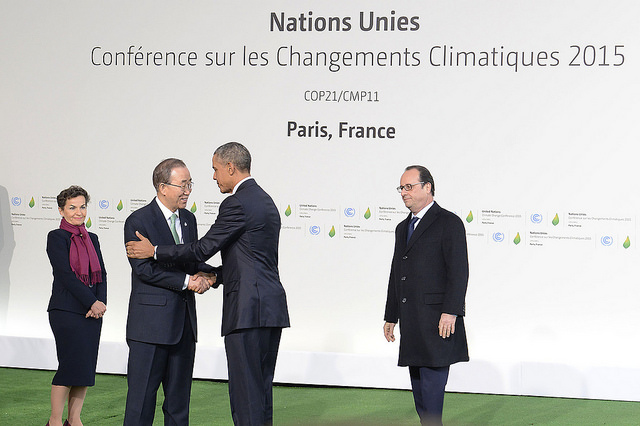
By Friday Phiri
As the eyes of the world turn on Paris for the much anticipated Climate conference (COP 21), US President Barrack Obama has agreed with proponents of a pro-poor deal that ensures more support for developing economies to adapt to climate change impacts.
The US President’s message seemed to resonate with what some stakeholders such as the African Development Bank (AfDB) have been calling for over the years—more support to developing countries, most of which are in Africa, not only to adapt but also transform their economies to low carbon pathways.
“As one of America’s governors said, we are the first generation to feel the impacts of climate change, and the last generation that can do something about it”, said Obama in his address at a leaders’ event on Monday, 30th November, attended by 150 heads of state and government, on the opening day of a crucial climate summit where expectations of delegates, especially from Africa, are high.
In adding impetus to delegates’ hopes for a fair and legally binding climate deal, President Obama acknowledged the USA’s historical contribution to the current problem and its readiness to take responsibility.
“As the world’s biggest economy and the second largest emitter, I am personally here to acknowledge not only our role in creating this problem but also embracing our responsibility to do something about it”, said President Obama.
It could be the ‘something’ that delegates especially those from Africa are waiting to hear and negotiating to be part of the new climate deal.
Sam Ogallah, Pan African Climate Justice Alliance (PACJA) Programme Manager says acknowledgements alone are not enough.
“We have heard this before. Major pronouncements have been made before but nothing has come to fruition yet. So, we are eager for further steps than what has been the case in the past”, he said.
In its COP 21 position paper, AfDB warns that Africa’s hard-earned development progress could go into reverse if the new climate deal does not limit warming to 1.5˚C and provides more help for Africa to adapt.
The AfDB, Africa’s Premier financial institution on climate change initiatives, particularly highlights Africa’s vulnerable to climate change, a continent that is already suffering from its worst effects, saying a strong deal at the 2015 United Nations climate change conference (COP21) is particularly vital for Africa because the continent faces acute climate risks.
Dr. Akinwumi Adesina, President of the African Development Bank Group said “Climate change is the greatest challenge of our time in development. COP21 presents a unique opportunity to meet that challenge. The voice of Africa is crucial to ensure the success of COP21. And the voice of Africa will be heard”.
According to the bank, seven Africans in every ten depend on on agriculture for their livelihoods, which is the economic sector’s most vulnerable and exposed to climate impacts as over 90% of African agriculture relies on rainfall.
High levels of background poverty mean that millions are already on the margins of survival; and for such people, even small climate changes can have a devastating effect.
Climate extremes such as drought, flooding, heat stress and tropical cyclones are set to become more intense and more frequent.
In fact, experts warn that in some cases, today’s climate extremes may become tomorrow’s “normal” weather.
Rising sea levels will threaten Africa’ large coastal population while Agriculture, tourism, cities, water levels, health, energy and fisheries are already negatively affected, and the problems are set to intensify.
And these issues were also highlighted by COP21 President, who is also French Foreign Minister, Laurent Fabius who identified terrorism and climate change as this century’s greatest enemies and called on governments to step up their efforts:
“The stakes are too high, and the menace of climate change is too great for us to be content with a minimalistic agreement. The Heads of State and Government who have come to Paris have come to express the voice of ambition.”
Speaking at the opening ceremony, which was webcast live around the world, UNFCCC Executive Secretary Christiana Figueres said that the eyes of millions of people around the world were on the governments meeting in Paris, not just figuratively but literally.
“You have the opportunity, in fact the responsibility, to finalize an agreement that enables the achievement of national climate change goals, that delivers the necessary support for the developing world and that catalyses continuously increasing ambition and action by all”, she told delegates.
Ms. Figueres said that the past year had been a turning point and that after many years of hard work, the world was finally seeing that the direction towards a low-carbon, resilient future was irreversible.
“This turning point is truly remarkable, but the task is not done. It is up to you to both capture this progress and chart an unequivocal path forward, with a clear destination, agreed milestones and a predictable timeline that responds to the demands of science and the urgency of the challenge.”
On the eve of the COP21 conference, 184 countries covering around 95 percent of global greenhouse gas emissions had delivered their National Climate Action Plans-INDCs to the UN Framework Convention on Climate Change (UNFCCC).
The world will know in the next two weeks as negotiations get underway.












